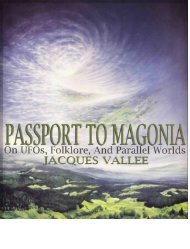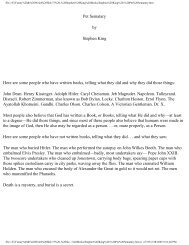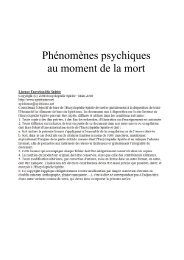extraordinary%20encounters
extraordinary%20encounters
extraordinary%20encounters
Create successful ePaper yourself
Turn your PDF publications into a flip-book with our unique Google optimized e-Paper software.
xvi Introduction<br />
deed to every indication channeling is just<br />
that. It is not veridical (that is, independently<br />
witnessed or otherwise shown not to be a subjective<br />
experience); no channeling entity can<br />
prove its existence, and the information provided<br />
through the channeling process is susceptible<br />
to neither verification nor falsification.<br />
The “authority” of the channeling entity<br />
rests solely on its self-identification. If you believe<br />
he, she, or it is a discarnate Atlantean,<br />
space alien, or ascended master, you will believe<br />
what he, she, or it has to say. If you<br />
choose not to believe any of that, the channeling<br />
entity will prove helpless to get you to<br />
change your mind. Experiences such as close<br />
encounters, conversely, may be veridical in the<br />
sense that on occasion they involve multiple—or,<br />
more rarely, independent—observers.<br />
In the case of multiply witnessed close encounters,<br />
subjective explanations are applied<br />
only with difficulty. An investigator in search<br />
of an explanation has limited choices, usually<br />
three: (1) the claimants made up the story; (2)<br />
they naively misperceived what were in fact<br />
conventional stimuli; or (3) they underwent<br />
an extraordinary experience that defies current<br />
understanding.<br />
Between the extremes is a broad range of<br />
nonexperiential material, a modern folklore in<br />
which the world and the cosmos are reinvented<br />
on the basis of believed-in but undocumented<br />
(and often, to those who care about<br />
such things, certifiably false) allegations. Most<br />
persons who circulate such stuff are sincere,<br />
but some of those who feed the stuff to them<br />
are not. Hoaxers provide documents, such as<br />
the supposed diary attesting to Adm. Richard<br />
E. Byrd’s voyage into the hollow earth<br />
through a hole at the North Pole, that believers<br />
cite to prove their cases. Most observers<br />
believe James Churchward’s famous (or notorious)<br />
books on the alleged lost continent of<br />
Mu are literary hoaxes—Churchward was<br />
never able to produce the ancient documents<br />
on which he asserted he had based his work—<br />
but earnest occultists and New Agers cite his<br />
books as overwhelming evidence that Mu<br />
(more often called Lemuria) was a real place.<br />
Of course, embellishments grow on top of<br />
embellishments, and every legend of a place, a<br />
world, or a realm that is home to otherworldly<br />
beings evolves and has its own rich history.<br />
Atlantis, for example, began as an advanced<br />
civilization for its time, but by our time its<br />
people had come to be seen as advanced even<br />
beyond us, the creators of fantastic technologies<br />
and even the recipient of knowledge from<br />
extraterrestrial sources. The hollow earth of<br />
John Cleves Symmes (1779–1829) is not the<br />
hollow earth of Walter Siegmeister (a.k.a.<br />
Raymond W. Bernard, 1901–1965), any<br />
more than the imagination of one century is<br />
the imagination of the century that follows it.<br />
Flying saucers were not part of Symmes’s<br />
world; consequently, they did not exist in his<br />
hollow earth. By the time Siegmeister wrote<br />
The Hollow Earth (1964), no alternative-reality<br />
book could lack flying saucers.<br />
It is entirely likely that nothing in the book<br />
you are about to read will tell you anything<br />
about actual extraordinary encounters and<br />
otherworldly beings. If such exist, however, it<br />
is not beyond the range of possibility that<br />
somewhere amid the noise of folklore, belief,<br />
superstition, credulity, out-of-control thinking,<br />
and out-of-ordinary perception a signal<br />
may be sounding. If so, it is a faint one, indeed.<br />
The world has always been overrun with<br />
otherworldly experiences, some of which certainly<br />
appear to resist glib accounting; yet so<br />
far it has proved exasperatingly tricky to establish<br />
that otherworldly experiences are also otherworldly<br />
events. The otherworld, perhaps,<br />
can happen to any of us at any time, but we<br />
may not live in it—at least if we know what’s<br />
good for us—in the way that we live enclosed<br />
within the four walls of the physical structure<br />
in which we read these words. It is not wise to<br />
pass through a world of physical laws while<br />
distracted by all-encompassing dreams. Even<br />
so, there is still a nobility to dreaming. There is<br />
also an undying appeal to the sort of romantic<br />
impatience that imagines new worlds bigger<br />
and more wondrous than our own, then





